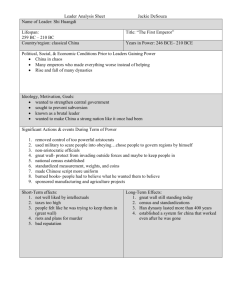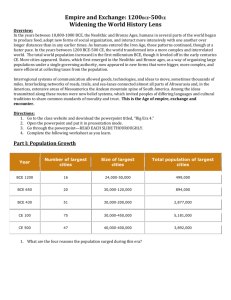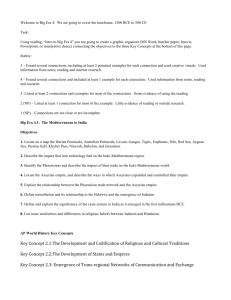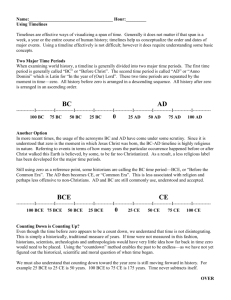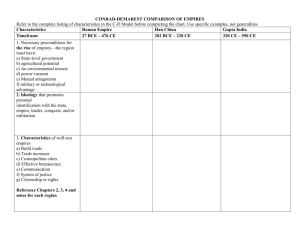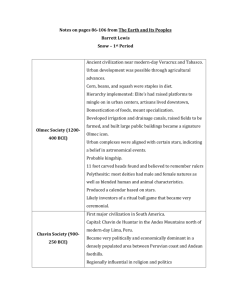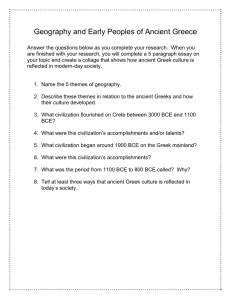File
advertisement
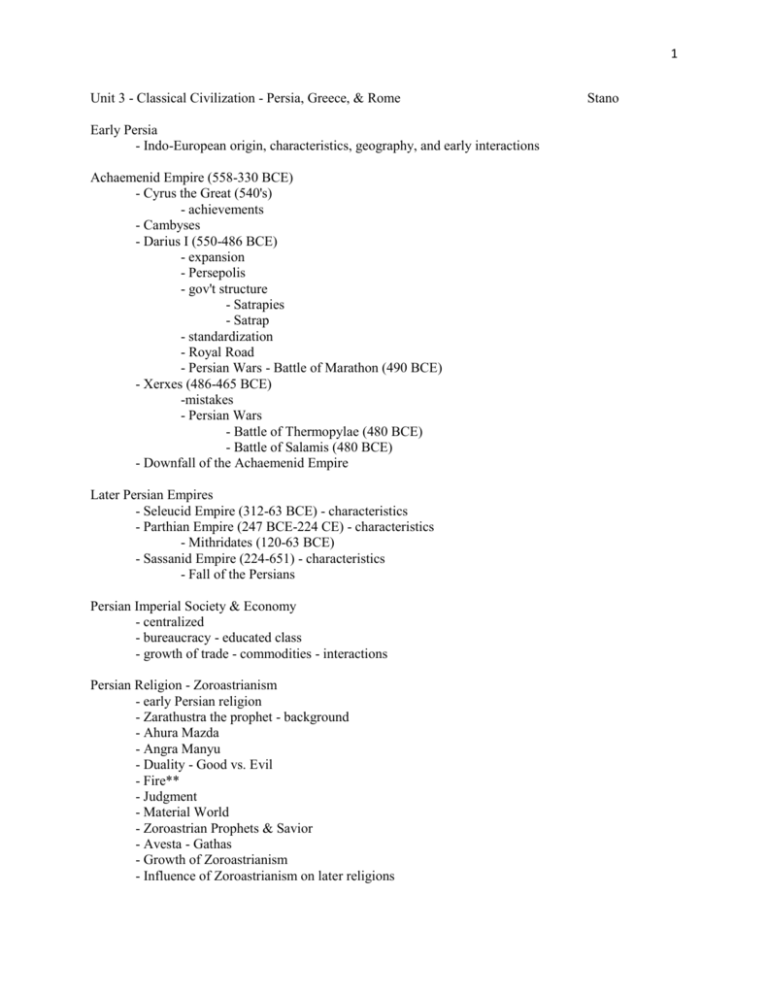
1 Unit 3 - Classical Civilization - Persia, Greece, & Rome Early Persia - Indo-European origin, characteristics, geography, and early interactions Achaemenid Empire (558-330 BCE) - Cyrus the Great (540's) - achievements - Cambyses - Darius I (550-486 BCE) - expansion - Persepolis - gov't structure - Satrapies - Satrap - standardization - Royal Road - Persian Wars - Battle of Marathon (490 BCE) - Xerxes (486-465 BCE) -mistakes - Persian Wars - Battle of Thermopylae (480 BCE) - Battle of Salamis (480 BCE) - Downfall of the Achaemenid Empire Later Persian Empires - Seleucid Empire (312-63 BCE) - characteristics - Parthian Empire (247 BCE-224 CE) - characteristics - Mithridates (120-63 BCE) - Sassanid Empire (224-651) - characteristics - Fall of the Persians Persian Imperial Society & Economy - centralized - bureaucracy - educated class - growth of trade - commodities - interactions Persian Religion - Zoroastrianism - early Persian religion - Zarathustra the prophet - background - Ahura Mazda - Angra Manyu - Duality - Good vs. Evil - Fire** - Judgment - Material World - Zoroastrian Prophets & Savior - Avesta - Gathas - Growth of Zoroastrianism - Influence of Zoroastrianism on later religions Stano 2 Classical Greece Early Greece - Indo-European origins - Minoans - characteristics - Mycenaeans - Trojan War Development of Classical Greek Government - Polis - no centralization - why? - various gov'ts form - Sparta - characteristics - Athens - characteristics - early democracy - Pericles Greek Economics - commodities - trade - interactions Greek Colonization - individual - motivation Greek Culture - language - literature - classics - playwrights - art - mathematics - history - philosophy Greek Society - patriarchal - slavery Greek Mythology - origin & foundation - Titans - Kronos - Olympians - Zeus & siblings - Titans vs. Olympians - Santarini - Tartarus - Zeus - King of the Gods - human relationships - nature of the gods - Hercules 3 Greek Philosophy - Sophists - pursuit of truth - reality - Socrates - teachings - Socratic Method** - death of Socrates - Platonic Philosophy** - Plato (424-348 BCE) - World of Forms - the senses - Allegory of the Cave - love - impact of Platonic Philosophy - Aristotelian Philosophy** - Aristotle (384-322 BCE) - categories - senses - "unmovable mover" - scientific method - logical progression - free will? - Geo-centric theory - truth will change? - impact of Aristotelian Philosophy - Stoic Philosophy Later Philosophers - Platonic Philosophers - Philo of Alexandria (30 BCE- 45 CE) - Judaism & Platonic thought - Neo-Platonism - Essence - Powers - Emanations - the Soul - Plotinus (205-270) - order - "The One" - Emanations from "The One" - 1st - physical - 2nd - spiritual - Triad of Divinity - impact on Christianity* 4 The Fall of Greece - legacy of the Persian Wars - Delian League - Peloponnesian War (431-404 BCE) - impact on Greek polis's Rise of Alexander the Great - Macedonia - Phillip II (359-336 BCE - goals & expansion - death - Alexander III of Macedon (356-323 BCE) - early life - takes the throne - characteristics & skills Alexander Conquers the World - military strategy - Greece- Anatolia- Egypt- Persia - India - Alexandria, Egypt - Hellenistic Culture*** - Death of Alexander - Empire divided - Seleucus - Antigonus - Ptolemy - legacy of Alexander Ptolemaic Egypt (336-31 BCE) - Ptolemy I - Ptolemaic Pharaohs - Greek speaking - Key to Ptolemaic power - Library of Alexandria 5 Early Rome - origins & Indo-Europeans - Etruscans Roman Republic (509-31 BCE) - Consul - Senate - social structure - patricians - plebeians - early protests - why? - Tribunes - Twelve Tables Punic Wars (264-146 BCE) - Rome vs. Carthage - Cause - Purpose - Geography - Series of 3 wars - 1st Punic War (264-241 BCE) - 2nd Punic War (218-201 BCE) - Hannibal Barca (247-182 BCE) - Military strategy - Battle of Cannae - Battle of Zama - 3rd Punic War (149-146 BCE) - Impact of Punic Wars in Mediterranean * From Republic to Empire - Problems for the Republic - List & Discuss * - Marius (157-86 BCE) - reforms to the military - impact as consul - Marius vs. Senate - Marius vs. Sulla - Impact of Marius Rise of Julius Caesar (100-44 BCE) - early life - rise to power - Triumvirate * - military power/achievements - Caesar vs. Pompey - Dictator - People supported Caesar, Why? - assassination - civil war erupts - Octavian vs. Antony & Cleopatra - Battle of Actium (31 BCE) - Republic is over - Rome is now an Empire 6 Reign of Augustus (63 BCE-14 CE) - Augustus * - achievements - List & Discuss - Pax Romana Early Roman Emperor Chronology - Julian Claudian Dynasty - Augustus - Tiberius (14-37) - Caligula (37-41) - Claudius (41-54) - Nero (54-68) - Flavian Dynasty - Vespasian (69-79) - Titus (79-81) - Domitian (81-96) - Nervan-Antonian Dynasty - Nerva (96-98) - Trajan (98-117) - Hadrian (117-138) - Antonius Pius (138-161) - Marcus Aurelius (161-180) - Commodus (180-192) Economy of the Roman Empire - agr. - manufacturing - Trade - commodities & routes Society of Rome - patriarchal - new classes form - comforts of Rome - List & Discuss The Culture of Rome - entertainment - List & Discuss - art - literature - technology 7 Religion of Rome Roman Polytheism - origin & traditions - Pontifex Maximus - cults - Cult of Mithras - Cult of Isis Judaism in the Roman Empire - Maccabees - revolt of 164 BCE - Jewish life - Jewish Revolt (66-70) - result & impact - Dead Sea Scrolls - Essenes - impact on history Birth of Christianity - Jesus of Nazareth ** - teachings - crucifixion - resurrection - Christianity spreads - Apostles - Paul of Tarsus * - Christianity and Cult similarities * - Christian persecution - martyrs - NO central authority early on - Early Christian writings - New Testament * - Bible * Early Forms of Christianity - Coptic Church - Egypt - St. Mark - Egyptian mythology & Christian symbolism - monophysitism - growth of the Coptic Church - Gnostic Christianity - Duality - Good vs. Evil - Two Gods - Gnostic Gospels - Individuality - Rejection & Hierarchy - Marcion Christianity adopted by Emperors - The Great Persecution - Constantine (272-337) - background - Battle of Milvian Bridge - Edict of Milan (313) - combining elements of pagan faiths 8 The Roman Catholic Church - Background - Council of Nicaea (325) ** - Constantine - Arius - teachings - Athanasius - teachings - Nicene Creed - Holy Trinity * - New Testament solidified - Centers of Christianity - Bishop of Rome - Pope - Papacy Development of Christianity - Christianity becomes patriarchal - original sin ** - Tertullion (160-220) - women in the early church - St. Augustine of Hippo (354-430) - neo-platonism - time - on the trinity Developments of the Late Roman Empire - Diocletian (284-305) - splitting the empire - Tetrarchy - persecution - Constantine (307-337) - empire unified - Constantinople * - Christianity - Julian the Apostate (361-363) - Theodosius I (379-395) Fall of the Roman Empire - NO one reason ** - inefficient leadership - plague & disease - legions weakened - mercenaries - role of Christianity - Germanic Invasions - 476 * - Fall of Western Roman Empire - East live son - Byzantine Empire - Western Europe enters the Dark Ages!
